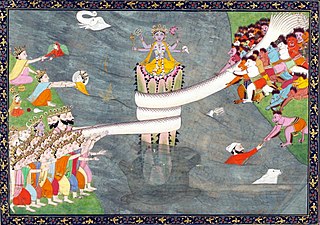BASAKA (VASUKI) Millions of Vasukis (Basaks) form Thy bed, O Lord! (Bhairo Kabir. p. 1163) In whose house, Basak (Vasuki) of one thousand hoods spreads itself like a bed…. (Malar Namdev, p. 1292) Like father and grandfather, the grandson has the Lord\’s approval making the foundation of spiritual power, he made the rope of Vasuki and churned the ocean with the churning stick of Meru. He churned out fourteen gems and enlightened the world. (Var Ramkali Satta Balwand, p. 968) Vasuki (Basak Nag) was the king of the Nagas (serpents) of the nether-regions (Patala). He was used as a rope, around the mountain Mandara, when the gods and demons churned the milk-ocean.
He is often identified with the Shesha Naga of a thousand hoods and on whose coils, Vishnu reposes. The Sikh Gurus and the radical saints do not give any importance to gods and deities. Their Lord-God has created millions of such gods and deities. In the third reference given above, the myth of Vasuki and the churning of milk-ocean has been mentioned figuratively. See : Shesha Naga
References :
1. Kohli, Surindar Singh, Dictionary of Mythological References in Guru Granth Sahib, 1993
The Significance of Vasuki in Hindu Mythology
Vasuki, the mythical serpent king, holds a prominent place in Hindu mythology and is celebrated for his pivotal roles in cosmic events and his profound symbolic meanings. As a Nāga, or divine serpent, Vasuki is revered not only for his strength and wisdom but also for his unwavering loyalty and devotion to higher causes.
1. Key Role in the Churning of the Ocean (Samudra Manthan)
One of Vasuki’s most significant appearances in Hindu mythology is during the churning of the ocean of milk, or Samudra Manthan. The gods (Devas) and demons (Asuras) sought the nectar of immortality (Amrita), and Vasuki was chosen as the rope for Mount Mandara, which served as the churning rod. The serpent’s willingness to endure the strenuous process and the pain it caused him showcases his selflessness and devotion to higher cosmic purposes. This act symbolizes the value of sacrifice and the importance of collective efforts to achieve great goals.
During the churning, Vasuki exhaled venom, which threatened to destroy the universe. Lord Shiva intervened and consumed the venom, thus protecting creation. Vasuki’s association with this event also highlights the dual nature of life—venom representing challenges and nectar symbolizing rewards.
2. Protector and Symbol of Loyalty
Vasuki is often seen as the protector of treasures and hidden knowledge, underscoring his role as a guardian. He is depicted coiled around Lord Shiva’s neck, signifying loyalty and close association with divine power. His placement on Shiva’s neck represents the harmonious relationship between cosmic energies and the natural elements.
In Hindu mythology, Vasuki’s devotion to Shiva serves as a powerful symbol of loyalty, humility, and service. It reminds followers of the importance of being steadfast in their commitments, particularly in spiritual and moral endeavors.
3. Connection to Nāga Symbolism
Nāgas, including Vasuki, hold a rich symbolic significance in Hindu culture. They represent primal energies, fertility, and protection. Vasuki, as their leader, embodies these attributes, symbolizing the connection between the earthly and spiritual realms. He is both a figure of power and a reminder of the need to respect and harmonize with nature.
The serpent imagery is also deeply philosophical, representing the cycles of life, death, and rebirth. Vasuki, in this context, symbolizes transformation and the constant evolution of existence.
4. Vasuki in Texts and Tradition
Vasuki appears in various ancient texts, including the Mahabharata and the Puranas, where he is mentioned as a noble and powerful Nāga king. His stories are not limited to mythology; they also inspire artistic and cultural expressions, from temple carvings to festival celebrations.
In Hindu rituals, serpents like Vasuki are venerated as divine beings associated with prosperity and protection. Vasuki’s name is invoked to seek blessings for spiritual growth and worldly success.
5. Philosophical Reflection
Vasuki’s narrative encourages introspection on themes of sacrifice, loyalty, and the balance between challenges and rewards in life. His presence in mythology inspires an appreciation for the interconnectedness of cosmic forces and the importance of enduring hardships to achieve greatness.
Conclusion
Vasuki’s significance in Hindu mythology is both cosmic and philosophical. As the serpent king who played a vital role in preserving the universe and serving the divine, Vasuki embodies qualities that resonate deeply with the ideals of devotion, resilience, and transformation. His story continues to inspire followers to reflect on their own roles in maintaining balance and harmony in life.





